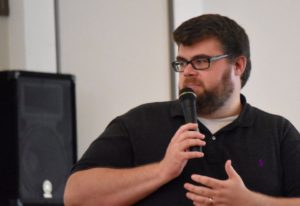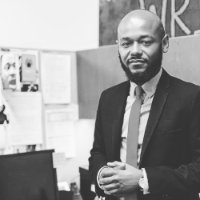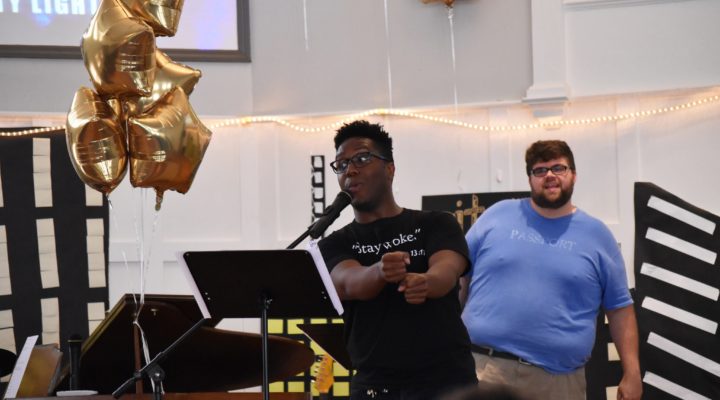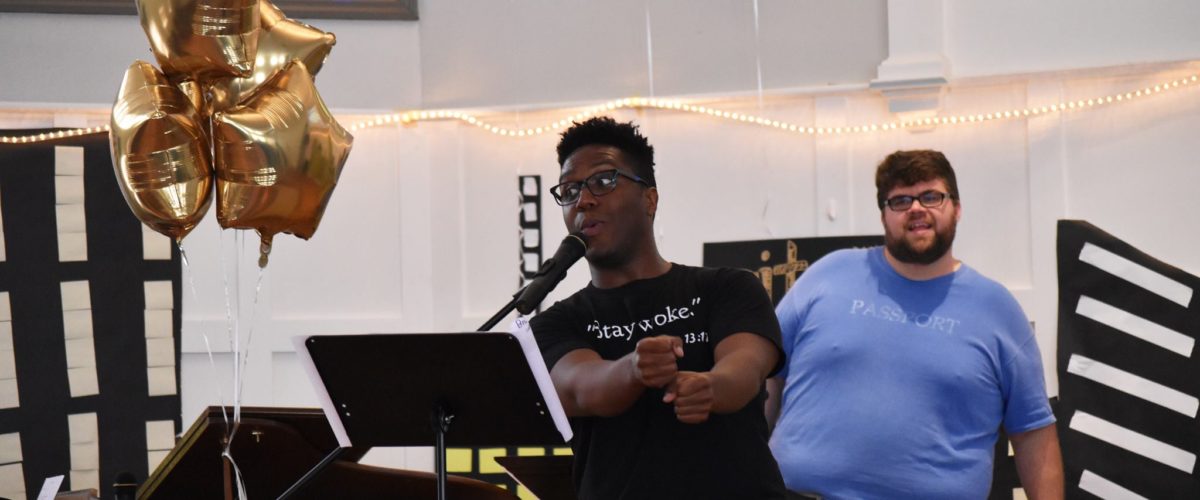Somehow, Trey Lyon is able to pack nearly an hour of gospel into a few short minutes of preaching.
And have it stick.
“Trey’s sermons are 10 minutes, but I would argue they do more work theologically and homiletically than others can do in 20 to 45 minutes,” says Jake Myers, an assistant professor of homiletics at Columbia Theological Seminary in Atlanta.
Lyon’s homiletic achievement is made possible by his adoption of a poetic style of preaching style that most Americans would identify as Hip-Hop or rap, Myers says.

Atlanta minister Trey Lyon has adopted the spoken word format during sermons and other presentations. Experts say the poetic style helps listeners connect their own experiences to the gospel. (Photo by Darci Jaret)
“I call it ‘spoken word,’” says Lyon, who is an Atlanta-based field personnel with the Cooperative Baptist Fellowship and a member of the pastoral staff at Park Avenue Baptist Church, which is located in the city’s urban core.
Spoken word is an oral art form that relies on recitation and word-play, intonation and inflection. It is a popular in poetry jams. It is similar to rap, only usually without musical accompaniment.
The use of entire or partial spoken-word is gaining in black settings and churches. However, many conservative African-American congregations shun it, or relegate it to youth group activities, because of its association with secular rap music, Myers said.
Lyon, who is white, did not learn the style in seminary or the suburban Southern Baptist church he grew up in, but in the urban, impoverished congregations and culture he serves in Atlanta. He gave his first spoken-word presentation during a Good Friday service this year themed around Black Lives Matter issues.
“I looked at where we are in the era of building walls and anti-immigrant sentiment, and how Jesus would have seen us,” he said.
The form felt freeing compared to other homiletic practices, but there was pressure to use evocative, impacting words — which also had to rhyme, he said.
And he found those freedoms and limitations to lend themselves to subjects of faith and culture.
“There is something inherently spiritual about spoken word,” Lyon said.
‘People appreciate what is real’
The blending of Hip-Hop culture’s musical and poetic forms with preaching, prayer and other church-based elements has gotten a boost from Black Lives Matter and other racial justice movements, said Michael Wortham, assistant pastor of college and young adult ministries at historic Ebenezer Baptist Church in Atlanta.

Michael Wortham
“It’s looking to create a movement focused on liberation and where we can talk about black-church culture,” he said.
Wortham was an organizer of the Hymns & Hip Hop conference at Ebenezer Baptist, held in September. Its seminars and workshops combined lessons in liberation and justice issues, social media campaigning and alternative forms of expression to “unpack power,” he said.
Wortham has used the style in his preaching, too. He might infuse sermons from popular rap tunes into a sermon otherwise preached in more conventional styles.
“Sometimes I might even accidentally do some couplets in a sermon. At other times I am more intentional about weaving it in,” he said.
What these forms of preaching are not, Wortham, added, are an effort to attract young people to church.
“But if you do it, I bet people will go to your church because people appreciate what is real,” he said.
‘The nitty gritty’
Myers traced the tradition of rap or spoken word preaching back to the 1990s. But it has historic roots.
“I would categorize it under the broad category of poetic preaching,” he said.
The category features the use of rhyme and meter and using evocative language that creates a space for listeners to make connections between the subject of the sermon and their own lived experiences, Myers said.
Preaching traditions in the Anglican and African-American churches are examples, he said.
“The power of poetic speech can call into question our … presumptions of how things should work … and lead us toward transformation,” he said.
“Hip Hop homiletics is tapping into that.”
Myers, who is a member of Park Avenue Baptist were Lyon serves, said the poetic tradition stands in contrast to the expository and propositional preaching styles in Baptist and other Protestant churches.
But Lyon said there is a connection between the hymns of the church and spoken word.
“The hymns of the church talk about struggle and deliverance and pain, and so does Hip-Hop,” he said.
That’s what connect the dots between the traditional church and ongoing struggles for justice, Lyon said.
“Hip Hop gets to the nitty gritty that we can’t talk about in church,” Lyon said.


